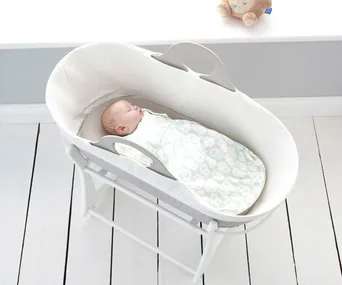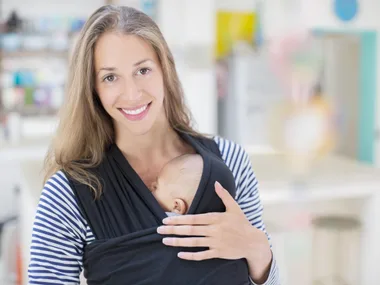Every baby is different and they will meet each stage at the age they are ready.
While there is no set development schedule for babies, the first year is about all those little moments that will help shape your tiny human.
The age they will learn to crawl, walk or speak will vary, so the following is simply a guide to some of the milestones you can expect your baby to reach in their first year.
1 to 2 months
PHYSICAL DEVELOPMENT: Your newborn will start gaining head control. She may move her head from side to side when placed on her front, or bob it against you when you hold her close to your chest.
MENTAL DEVELOPMENT: Research has shown babies start copying adult facial expressions very early on in life. Test this by sticking your tongue out at your baby and see if she copies you.
3 to 4 months
PHYSICAL DEVELOPMENT: Your baby has almost gained complete head control. She has also discovered her hands and likes to touch everything.
By four months, your baby may kick with more coordination and realise she can use her legs to make objects move, such as a mobile. Her grasping skills have also improved.
MENTAL DEVELOPMENT: Her communication skills are improving and she might begin wriggling or making noises so you’ll pick her up.
As her awareness grows, your baby displays more enjoyment of games like splashing around in the bath. She’s much more responsive and vocal, too, and will ‘chat’ for ages.

By around the four month mark, your baby will gain almost complete head control.
(Getty Images)5 months
PHYSICAL DEVELOPMENT: You may be impressed by your baby’s strength and trunk control as she starts to master rolling over. She can now also sit propped up for longer periods of time, and may even try to sit up by herself.
MENTAL DEVELOPMENT: Your little one may show a big mental leap that accompanies her growing hand dexterity – she can concentrate and hold onto objects better.
Her social awareness is increasing, and she know who her parents are and she may start protesting at strangers.
She may begin to understand cause and effect. For example, she may begin to understand that a ball moves when it’s rolled. She may also cry to get your attention.
6 months
PHYSICAL DEVELOPMENT: When lying on her front, she can push herself up, arch her back and raise her head. She may also reach for toys from this position.
MENTAL DEVELOPMENT: Your baby can entertain herself by looking at new objects or talking to herself. In fact, you may hear her repeating sound patterns as she experiments with different sounds. If she’s babbling in a singsong voice it’s a good sign her hearing is okay.

When babies begin crawling, they can learn with surprising speed.
(Getty Images)7 to 8 months
PHYSICAL DEVELOPMENT: Your bub has started to sit with a straight back for several minutes without toppling over. She may also be a little more mobile, having mastered the ability to roll over. Towards the end of eight months, she may be able to squirm or commando crawl across the floor. She can also swivel around and support herself on one hand so that she is able to grab a toy.
MENTAL DEVELOPMENT:Your baby may be starting to understand the concept of language. She might be copying the sounds you make, especially if they’re one syllable and start with a consonant formed with the lips, such as “bah”or “mah”.
9 months
PHYSICAL DEVELOPMENT: With her stronger trunk muscles and improved balance, your baby is probably now great at sitting.
She might be able to bear her weight on her legs, and may be making her first moves towards standing.
MENTAL DEVELOPMENT: Objects are becoming a source of fascination, your little one may start to work out how they mix and match. She is realising that a spoon goes into a cup, and that a certain lid sits on top of a saucepan.

When bub is learning how to take her first steps, she will enjoy being ‘walked’, with you holding both her hands.
(Getty Images)10 months
PHYSICAL DEVELOPMENT: When babies begin crawling, they can learn with surprising speed. She may develop coordination and strength quickly, progressing from being a new crawler to a confident traveller within a matter of days.
MENTAL DEVELOPMENT: Her babbling is more like a real conversation now, with rising and falling intonations, repetition and exclamations. Your baby may even say one word you can understand.
11 months
PHYSICAL DEVELOPMENT: Some babies may take a step or two at 11 months, but others might not do it for a while longer yet. She may also enjoy being ‘walked’, with you holding both her hands or ‘cruising’ by holding onto furniture.
MENTAL DEVELOPMENT: Your baby may be fascinated by books and loves it when you read to her.
12 months
PHYSICAL DEVELOPMENT: The average age when a child takes her first steps is between 12 and 13 months, but it can be later.
Increased wrist flexibility and much finer individual finger control means your baby will attempt more complex tasks, such as trying to build a tower of two or more blocks.
MENTAL DEVELOPMENT: You may have noticed your baby can communicate very well, especially at times when she wants you to
do something.
Development reviews
It’s a good idea to make regular visits to your local child health centre to check on your baby’s development. This ensures any problems are picked up and treated as soon as possible. Your midwife or early childhood nurse can organise a series of appointment for you and bub.




